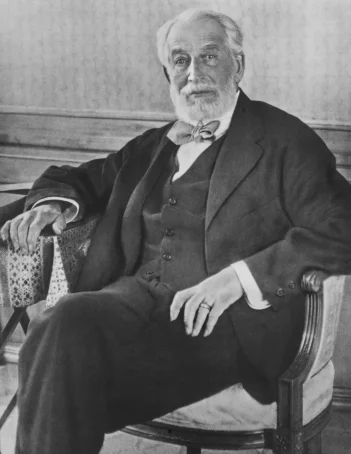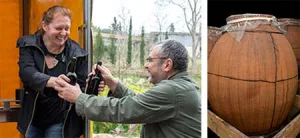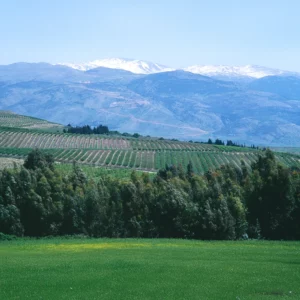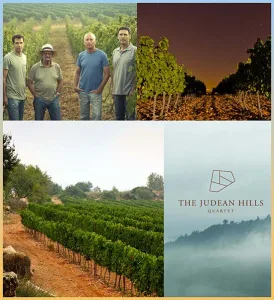Lets destroy some popular misconceptions: Not all kosher wine is made in Israel and not all Israeli wine is kosher! Nowadays nearly every wine producing country in the world produces kosher wine and in Israel, just to be confusing, many of the newer, smaller wineries make non-kosher wine.
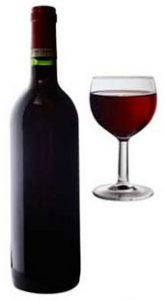
However it is true to say that the majority of wine made in Israel is kosher.
This should not be regarded as unusual. In the same way you would expect a French winemaker to speak with a French accent, or an Italian winery to have an i at the end its name, you should not be surprised that Israel makes kosher wine. Likewise in the same way New Zealand specializes in Sauvignon Blanc and Argentina in Malbec, Israel specializes in kosher wine. Nothing wrong in that. Unfortunately the word kosher, where wine is concerned, is almost a pejorative term. If it is kosher, there are those who believe it cant be good.
Usually Israeli wineries prefer to ignore the k word. It is obviously supremely important for those that need it, but apart from this, wineries want to be known for producing great wines, whether kosher or not. However for many wine lovers and others ignorant about its effect, the kosher certificate is seen as nothing less than a mark of Cain. So lets meet the k word head on.
Oldest Wine Laws
The kosher wine laws are the oldest wine laws in the world. France may boast about its Appellation Controlle system and Cru Class classification, which have roots that may go back hundreds of years, but the Kosher wine laws are measured in thousands. Some of these laws (orla, kilai hakerem) still make sound agricultural sense.. Others (like shmittah, trumot & maserot) are today regarded as more symbolic. In Biblical times though, they were revolutionary, addressing the profoundest issues of spirituality vs materialism, economic justice and ecological sustainability. One thing is for certain, not one of the kosher wine laws may be held as a reason for making poor wine.
The kosher designation should not be thought as a quality defining process. Think of kosher certification more like a quality assurance program, similar to the ISO systems. All raw materials like yeasts, barrels and fining agents have to be prepared under the strictest quality and hygiene standards. Origin and traceability are key and there is an exaggerated emphasis on cleanliness. However there is nothing which alters the basic way of making wine and traditional methods are followed throughout the process.
As fining agents from animal or diary sources are not permitted, most kosher wine is suitable for vegetarians and if egg whites are not used for fining, for vegans too. In a world where all things organic become more important, kosher wine has a virtue that anything added or utilized in the winemaking process has to be strictly and rigorously checked before permission is given.
Regrettably, kosher wine is often confused with the Kiddush wine category. These are the sweet, red sacramental wines that have given kosher such a bad name. However in reality, a wine can be well-made or poorly made. In terms of quality, it is irrelevant whether it is kosher or not.
The other category which receives a bad press are mevushal (pasteurized) wines. Without exception, the finest kosher wines are not mevushal. However those wineries that need to make mevushal wine, usually for kosher caterers or kosher restaurants in the United States, are improving techniques by using flash pasteurization or pasteurizing the must and not the finished wine.
However strict observance of kashrut does not prohibit the possibility of either making great wine or drinking a fine wine for purposes of religious ritual. Even one of Judaism greatest sages, The Rambam, aka Maimonides, gives guidance here. He was a proponent of quality wines and insisted that sweetened or pasteurized wines should not be used either for Kiddush or Arba Kossot (The Four Glasses) at Passover.
Thirty years ago most kosher wine was sweet, or at best semi dry. The first wineries to make world class kosher wines were the Golan Heights Winery from Israel and Herzog Cellars of California. The Golans Yarden brand won more trophies and medals in major competitions than any kosher winery and Herzogs Reserve wines received higher scores in the Wine Spectator than any other kosher brands at that time. Since then they have been followed by a host of other wineries, many of them have proved that kosher can be synonymous with quality.
Castel Becomes Kosher
Domaine du Castel is a winery founded in 1992, which for ten years made wine that was not kosher. From 2003, the winery became kosher. Owner Eli Ben Zaken said: Although I am not a religious Jew, I am a patriotic one and the fact that I was producing a wine some of my fellow Jews couldnt drink was bothering me.
Proof of the pudding is in the eating. Kosher Castel has won even greater international acclaim than Castel did previously. This is the best example yet that the kosher stamp does not affect quality. As Ben Zaken explained: We decided to make all our production kosher. After all, its as easy to employ an observant Jew as it is to employ a non-observant one. The change did not adversely affect quality. Maybe the opposite, the winery has not stopped receiving recognition at the highest level since.
Carmel Quality Revolution
A mere six years ago all Carmels wines were mevushal or flash pasteurized. Since then Carmel has gone through a revolution. New cooler vineyards were planted, modern state of the art wineries were built and young dynamic French and Australian trained winemakers were employed. A new management strategy changed the company from volume to quality and from sacramental to single vineyard wine.
Today Carmel is making some of the finest wines in Israel. All are 100% kosher, but they are no longer mevushal. It is now possible to say Carmel makes great wines, that just happen also to be kosher.
Carmel, the oldest and arguably most famous Jewish brand worldwide, used to symbolize everything nostalgic about Jewish wine. Now it represents the revolution in Israeli wine. Carmel are winning awards and new recognition. The Carmel Limited Edition, Single Vineyard wines like Kayoumi and Appellation wines are all having rave reviews. Also Yatir, Carmels boutique winery, is Israels most exciting new quality winery in the last 10 years. The message is that it is possible for kosher wineries to seek excellence, whilst still maintaining a very strict level of kashrut.
Kosher Wines Outside Israel
Kosher wine may also be made well outside the land of Israel. Jeff Morgan, a wine writer with the Wine Spectator, started producing his kosher wine in answer to a challenge. On being asked why there were no great kosher wines, he could not think of a reason. The winery workers were trained like any others. The winery equipment was the same as other wineries and the Cabernet Sauvignon grapes were the same quality as some of the best in California. The winemaking procedures were the same. So he set out to make one. When he launched a Napa Valley wine by the name of Covenant to great acclaim, he had proved his point. It was possible to make world class wine, which was also kosher.
Celler de Capcanes in fact became a quality winery because of the success of an initiative to make a kosher wine! It was previously a large co-operative making bulk, non kosher wine in the Montsant region of Spain, near Priorat. Then, in order to be good neighbours, they decided to make a kosher wine for the local Jewish community in Barcelona. This entailed purchasing new equipment.
The success of the resulting kosher wine, Flor de Primavera – Peraj Haabib, encouraged a whole change in direction. Like Carmel they decided to change the emphasis of their production from bulk to quality. In this unique instance it was the success of the kosher wine, which encouraged Capcanes to improve its non kosher wines! At the same time they proved that it is possible to make a quality product, adhering to the rules and restrictions, at what is basically a non kosher winery.
There are other famous wine labels that also make a kosher cuve. Laurent Perrier, Chteau Giscours, Chteau Pontet Canet , Chteau Loville Poyferr and Chteau Smith Haut Lafitte are examples. There are also big brands that have a kosher version like Fortant de France and Mouton Cadet. Even some of the worlds most famous winemakers, like Ricardo Cotarella from Italy, are also now making kosher wine. Many produce very good wines but do not always succeed to match the non kosher version. The reason may be logistics, the need to sometimes pre-determine the timing of the harvest or to train a special, new workforce on the job.
Most Expensive Kosher Wine
The most ambitious kosher wine was produced by Jean-Luc Thunevin. His Chteau Valandraud was one of new garagistes that upset the old order in Bordeaux in the 1990s. Thunevin, though not Jewish, decided to make a kosher wine alongside his highly priced Grand Cru St. Emilion wine. As Christian Dalhavie, the export manager, explained: Valandraud is made out of 40 to 50 different vats. The kosher is only made from two vats.
Where Thunevin differed from some of the other big names was that he personally chose to market and put his name behind the kosher wine. He wanted the kosher & non kosher wine to be of similar quality and gave tastings of the two together. The kosher and non kosher editions even cost the same price just under US$ 300 a bottle! The result was a wonderful advertisement for kosher wine, which also happened to be the most expensive kosher wine in the world.
Enter Robert Parker
It is often the Jewish community itself, that is the most cynical with regard to the acceptance of the possibility of quality kosher wine. A lifetime of Palwin, Manischevitz, or pasteurized wine at Simchas, Shabbats and Seders has had an effect
One particular connoisseur was not swayed by the k word. Robert Parker, the most famous and influential wine critic on the planet, tasted Israeli wines for the first time recently. Obviously he was tasting for quality and potential and the issue of kashrut was not considered relevant. Revealingly, the top six wines receiving the best scores, between 91 to 93 points, all just happened also to be kosher. No less than 12 Israeli kosher wines scored 90 points or over, a much sought after score by wineries all over the world. Any wine receiving between 90 and 95 points is categorized by Parker as an outstanding wine of exceptional complexity and character. In short, these are terrific wines.
Mark Squires, Parkers Israel specialist, summed up his views in Parkers Wine Buyers Guide, on whether the kosher certification had any significance for the non kosher consumer: The simple answer is that no one should avoid wines simply because they have kosher certifications. Based on my tastings, kosher wines were amongst the best in this report, such as those from Domaine du Castel and Yatir. Kosher designation seems irrelevant, as long as the wines are not also Mevushal.
He goes on to say:The most important thing to understand is that those sickly sweet Passover wines Americans are used to have nothing to do with the types of wine Israel is bragging about these days. Israeli wine isnt an oddity anymore, and it is certainly not just for those who keep kosher.
Best Kosher Wines in the World
So if kosher wines are so good, which are the best
The leading Israeli kosher wineries according to Hugh Johnsons Pocket Wine Book 2009 are Castel, Yatir, Yarden, followed by Carmel, and Galil Mountain. Interestingly this view was supported by the Robert Parker/ Mark Squires viewpoint. In the Wine Advocate, the four Israeli wineries which succeeded in getting at least two wines with 90 or more points were the same names: Carmel, Castel, Yarden and Yatir.
The top kosher red wines to receive 90+ points from Robert Parker are:
1. Yatir Forest 2003, Judean Hills, Israel, with 93 points
2. Covenant 2003, Napa Valley, California 2003, 93 points
3. Castel Grand Vin 2004, Judean Hills, Israel, 92 points
4. Chateau Valandraud 2005, St Emilion, Bordeaux, 90-92 points
5. Yarden Katzrin 2003, Galilee. Israel, 91 points
6. Carmel Limited Edition 2004, Israel, 90 points
7. Yatir Forest 2005, Judean Hills, Israel, with 90 points
8. Capcanes Flor Primavera Peraj Haabib 2000, Montsant, Spain, 90 points
9. Castel Grand Vin 2003, Judean Hills, Israel, 90 points
10. Castel Grand Vin 2005, Judean Hills, Israel, 90 points
11. Yatir Cabernet Merlot Shiraz 2003, Judean Hills, Israel, 90 points
12. Petit Castel 2005, Judean Hills, Israel, 90 points
13. Galil Mountain Yiron 2003, Upper Galilee, Israel, 90 points
It is interesting to note the number of Israeli wines on the list. Castel has four wines in the top 13. Carmel also has four, taking Carmel & Yatir wineries together. The Golan Heights and its subsidiary, Galil Mountain, have two between them.
Incidentally the best kosher white wine was the Castel C Blanc du Castel, Judean Hills, Israel 2005 (91 points) and the best kosher dessert wine was the Yarden HeightsWine, Galilee, Israel 2005 (93 points). The scores are taken from The Wine Advocate and Parkers Wine Buyers Guide.
Conclusions
This article draws me to three conclusions.
It is clear that a kosher wine may be a genuine world class wine. The kosher designation is no bar to quality.
It is far easier for a winery which observes kashrut to produce kosher wines of real quality, than it is for a non kosher winery to produce the occasional kosher batch of the same quality.
It is obvious to me that outstandingly the best quality and best range of kosher wines made today come from Israel. So in the same way, it can be said that many countries make very good sparkling wine, but the best is still thought to be Champagne in France, it is no contradiction to say the finest kosher wines come from Israel.
Let us face it, kosher wines have a bad reputation because once they were pretty awful. Now they are not. The public have taken time to catch up to the new reality and the k word stigma still exists. The worlds leading wine critic has given them his approval, it is time the wine drinking public did the same.












